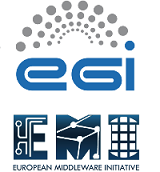Speaker
Overview
KnowledgeGrid Malaysia is based on gLite. Since KnowledgeGrid Malaysia is used by several universities and user communities it was important to solve the problem of accounting and SLA support for the users. The single entry point for scientists is based on P-GRADE Portal and hence the accounting and SLA support is built into the portal as new portlets. The talk will explain how KnowledgeGrid Malaysia and P-GRADE Portal was extended with accounting and SLA support.
Impact
KnowledgeGrid Malaysia is used by several universities and user communities and hence the balanced use of the grid among these communities required the measurement of the use of the grid sites as well as the provision some guaranteed start-up time for the users.
The solution is generic enough that it could easily be adopted for any gLite-based VOs of the EGI community.
Description of the work
The accounting portlet of KnowledgeGrid Malaysia portal presents accounting information from the connected grids sites on a per job and per user basis. The main feature of the accounting portlet is the traceability of consumed CPU time. In the accounting portal we can define two user roles: generic user and system administrator user. The generic user is able to check CPU time consumed by his/her own jobs. The system administrator is able to check CPU time consumed by any user belonging to the grid.
The solution is based on the APEL accounting system, an optional module used in some EGEE VOs. APEL serves as a back-end service for the newly developed account Portlet. APEL is capable of collecting resource consumption statistics from EGEE Computing Elements and publishing this information into a central database. APEL can be installed as optional components for EGEE grids.
The SLA framework can offer users of P-GRADE Portal with a guarantee that his/her application would start on the KnowledgeGrid Malaysia before a given deadline. The features of this SLA solution are the following:
The application startup deadline is generated by the Portal based on dynamic values that originate from the system state instead of being defined by the portal administrator. Several parameters are taken from the environment dynamically, such as
1. Current number of users and application instances that run simultaneously within the portal and could delay the startup time of the current application.
2. The number of resources that are available in the system and can be assumed that will operate correctly in the near future.
3. The length of the applications that are currently running in the grid.
The talk will explain the architecture of the accounting and SLA support system as well as their user interface within the P-GRADE portal.
Conclusions
This talk explains the specifications and implementation of the applied accounting system and the complex SLA solution of-
fered by P-GRADE portal for KnowledgeGrid Malaysia. This complex SLA allows portal to calculate deadlines of workflow startup before the submission of the workflow. Based on the calculated deadline, the user can choose if he or she wants to run the workflow within the given deadline or not. If yes, the jobs of the workflow will be sent to high-availability Tier 1 sites. If not, the jobs will be excluded from Tier 1 sites. The complex SLA uses dynamic values for calculating the deadline formula.

